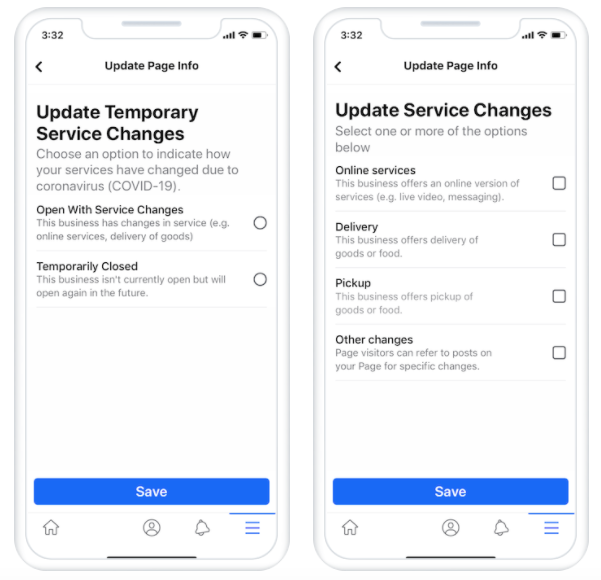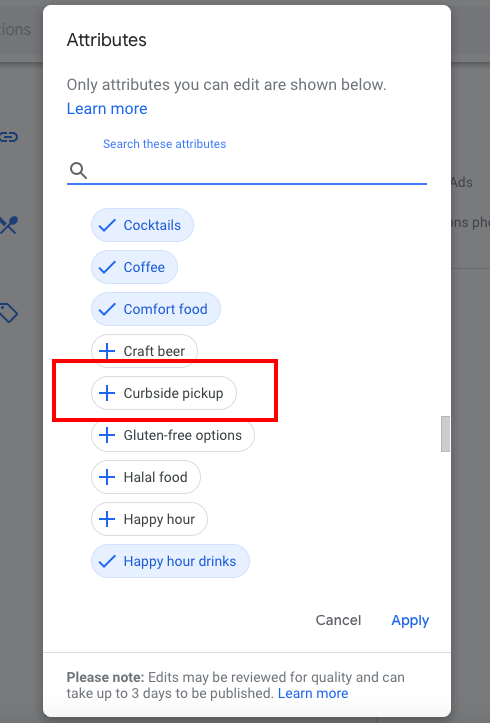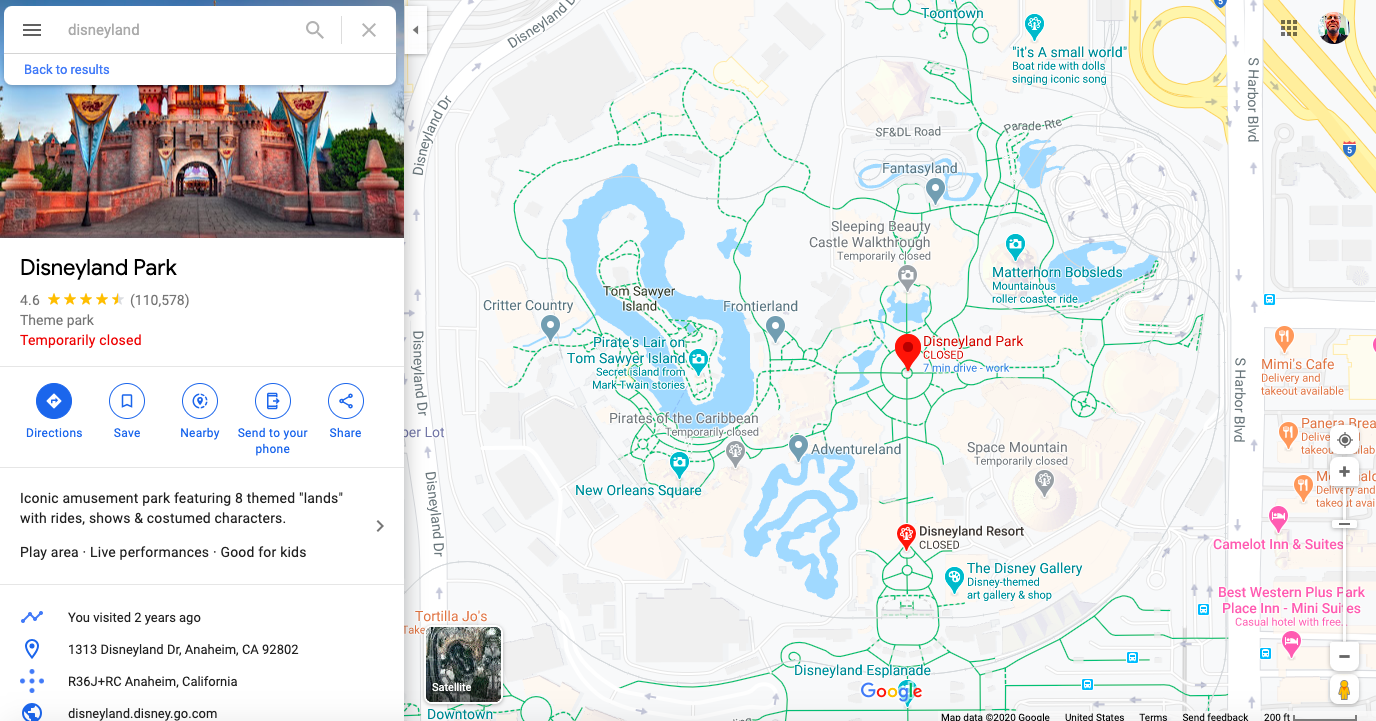Damian Rollison | Apr 6, 2020 6:00:00 AM
5 Min Read
In this week’s Monday Memo, we cover Facebook’s updates for businesses affected by COVID-19; Google’s release of location data that measures compliance with shelter-at-home orders; a new GMB page for food businesses; Google’s curbside pickup attribute; an update to Google map pin display; and a new study on patient search trends from Kyruus.
On April 2, Facebook announced several changes to business pages, designed to make it easier for businesses to mark themselves temporarily closed or to indicate they are still open but with modified services. Though Facebook is late in offering these options -- lagging behind Google, Yelp, Bing, Foursquare, and Apple, who began making similar updates in the early days of the pandemic -- the social media giant has done a better job with this update than some publishers of helping businesses indicate special circumstances.
In the settings for a store’s Facebook page, business owners can now go to a Temporary Service Changes menu that allows them to indicate temporary closure or, by choosing Open With Service Changes, to showcase new online services, delivery, pickup, or any other changes, which can be explained in a post. Facebook’s announcement highlights a few possibilities for the “other” category, such as special hours for the elderly or the ability to purchase gift cards.
Though Facebook may not seem the hub for local search that Google is known for being, it’s worth remembering that there are 150 million business pages on the platform, and that Facebook has seen a huge spike in traffic during the pandemic.
 Image courtesy Facebook
Image courtesy Facebook
Google is sharing location data from smartphones with public officials to help track the success of shelter-at-home orders due to COVID-19, the company announced Friday. The data comes from users who have elected to share location data. Google is using the same type of anonymized, aggregated data for this purpose that they have used in the past to indicate busy times at restaurants and other businesses in Google Maps.
The reports are public and currently cover 131 countries. Reports offer data on foot traffic patterns in six categories: retail and recreation, grocery and pharmacy, parks, transit stations, workplaces, and residences. Advertising companies with access to location data have also begun sharing it with the government to help with crisis response, and Facebook has shared location data with academic researchers.
As for Google’s data, it indicates trends such as a large decrease in California of time spent at shopping locations and transit stations, but is not specific enough to help with initiatives such as contact tracing, nor is Google’s data tracking as invasive -- but, arguably, effective -- as the geofencing that is being used in Taiwan to ensure non-infected citizens avoid getting close to those known to have coronavirus.
Google posted a new help page on Friday that advises food-related businesses -- restaurants, grocery stores, and others -- about how to set up Google My Business properly in light of changes due to COVID-19. The page highlights the need to update hours of operation as appropriate and to highlight the availability of takeout, delivery, and curbside pickup -- all of which are now more prominent in search. The page also advises restaurants to update menus on Google if they have had to reduce or modify their selection.
All food-related businesses should consider creating Google Posts to share more detailed information, such as additional safety practices the business has recently implemented. Google also recommends setting up Messaging within the Google My Business app in order to open a line of communication with customers, as well as using the company’s Ordering app or a third party service to enable online ordering.
Google My Business has been working, as a part of its COVID-19 response, on updating the attributes available to businesses to indicate special features, amenities, and offerings within their GMB profiles. I noted last week that the display of pickup and delivery options for restaurants was recently made more prominent. Now, Google has added “Curbside pickup” as an attribute for all shopping and dining categories, acknowledging the need many businesses have to highlight this newly important offering.
Indeed, many retail businesses quickly implemented contact-free curbside pickup as soon as the pandemic required stores to close their doors to foot traffic; now, these services will be easier for consumers to find. This update is one in a series of attribute updates Google will roll out in response to the pandemic, according to sources at the company.
 “Curbside pickup” in the GMB dashboard
“Curbside pickup” in the GMB dashboard
On Friday, posts on Twitter began noting the appearance of new map pin colors and descriptive text in Google Maps. For many users, businesses marked temporarily closed are now showing up in Maps with grey map pins and the text “Temporarily closed,” in the place where Google’s editorial descriptions used to be displayed. A particularly dramatic example is that of Disneyland, a few miles from Brandify’s main offices, which now shows on the map as though it has been greyed out. You’ll note from the screenshot that some locations are also marked in red with text reading “CLOSED.”

Additionally, restaurants who have indicated they are open for takeout, delivery, or both will now have map pins indicating these options in the place previously reserved for a brief description of the business. Presumably, additional attributes relevant to COVID-19, once fully rolled out, will also be showcased in Maps.
Kyruus, the well-known healthcare marketing platform that is also a Brandify partner, has published a new study showing trends in consumer search for healthcare services during the coronavirus pandemic. Kyruus has access to this data due to powering provider search platforms for a large number of healthcare facilities and practitioners throughout the United States.
The study shows some expected increases in searches for terms such as “covid-19,” “coronavirus,” and related terms such as “cough,” but it also highlights the need for patients to have ongoing access to services they would need whether or not a pandemic was underway. In fact, the most popular search terms on healthcare sites, according to the study, were not related to coronavirus at all; at the top of the list were terms like “diabetes,” “cancer,” and “pregnancy,” suggesting that patients are concerned to make sure they can still access these services.
In addition, the study noted an increase in searches for mental health and support for anxiety and depression, likely indicating secondary impacts of the pandemic.
Topics: Monday Memo

VP of Market Development and Strategic Partnerships
Offer Post Justifications Spotted in Local Results
Oct 4, 2021 8:47:46 AM
Monday Memo: More than Brands and Influencers, Consumers Trust Each Other
Sep 27, 2021 7:56:34 AM
Monday Memo: Google Adds “Latino-Owned” to GMB Identity Attributes
Sep 20, 2021 7:58:58 AM
Monday Memo: New Study Shows 94% of Consumers Use Online Business Directories
Sep 13, 2021 7:16:55 AM
Monday Memo: The Page Experience Update Has Fully Rolled Out
Sep 6, 2021 7:43:45 AM